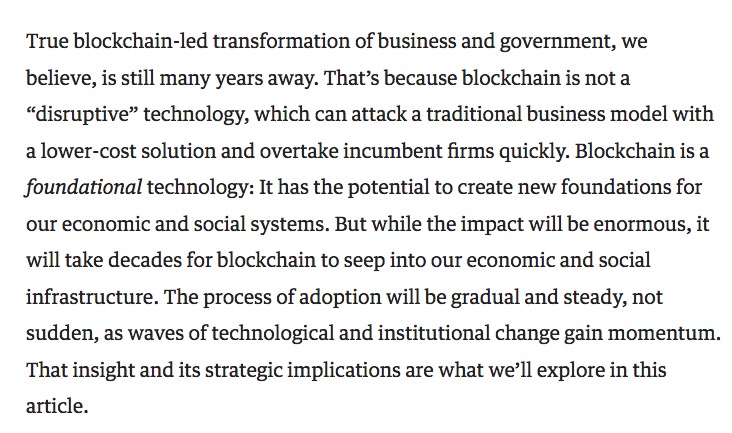Recent hype in blockchain aside, the fact that Blockchain is a completely different approach to doing tech can't be denied. Some key differences which make it non-intuitive to understand are:
It's a completely distributed system and not just in terms of distribution as a way to ensure redundancy or load-balancing. The way blockchain works assumes distributed architecture, with each node capable of working independently. This is very different from the traditional way of designing server-client based architectures.
The protocol doesn't assume that people will play nicely. In fact, the core assumption is that if something can be broken, it will be broken. What is interesting is the way in which incentives are designed in such a way that the best strategy for each player is to act according to the protocol. The game-theoretic insights built into the protocol incentivise players to act in a way that makes the system work.e.g. Byzantine Fault Tolerance is one of the core concept around which the protocol is based.
The protocol developers have taken a very long view of how societies will evolve and have not constrained themselves to current social and economic systems. Bitcoin, which is one of the most popular applications of blockchain, fundamentally challenges the idea of money. We assume money to be something which is issued and regulated by govt. and derive its value from the guarantee of the Central bank. But this is a recent trend in history, and till 1933 US dollar was backed by gold (Gold Standard)
Blockchain technology was developed by geeks and visionaries who imagined an alternate reality in which society can function. It was completely missed by the VC ecosystem except a few exceptional VCs like Fred Wilson at USV. Part of the reason may be because traditional venture funds work on a 7-10 yr time horizon, and blockchain was something which needed time horizon much bigger than that.
Tokenization is a core mechanism by which these new protocols are funded, and is a very different way of thinking about business model and equity. Tokens at the same time work as the basic unit of value in the protocol (or an alternative for money) and also provide user a share in the value appreciation of that protocol. So, you are an investor and user at the same time just by virtue of holding the tokens and using them. Of course, there needs to be certain conditions met for this to occur, and not all business models can be tokenized - this is a fresh way of thinking about funding projects.
Most succinctly, this has been captured by this HBR article which argues that blockchain is not a disruptive but a foundational technology.

If we agree that Blockchain is a technology whose repercussions will be felt in the coming 5-10 years, I think the best way to benefit from it is to really build your foundations in the technology and understand the core ideas and not get swayed down in the hype. Blockchain is at a point where World Wide Web (www) was in 1980s, and the FBs and Googles are yet to be built. Or who knows, may be there won't be tech giants created by this tech wave and the societal impact will be very different from that of World Wide Web.
Resources
Whitepapers
Blogs
Tech Basics
Twitter Handles to follow
Slack Channels/Gitter
- Coinfund slack
- Bitcoin slack
- Ethereum gitter